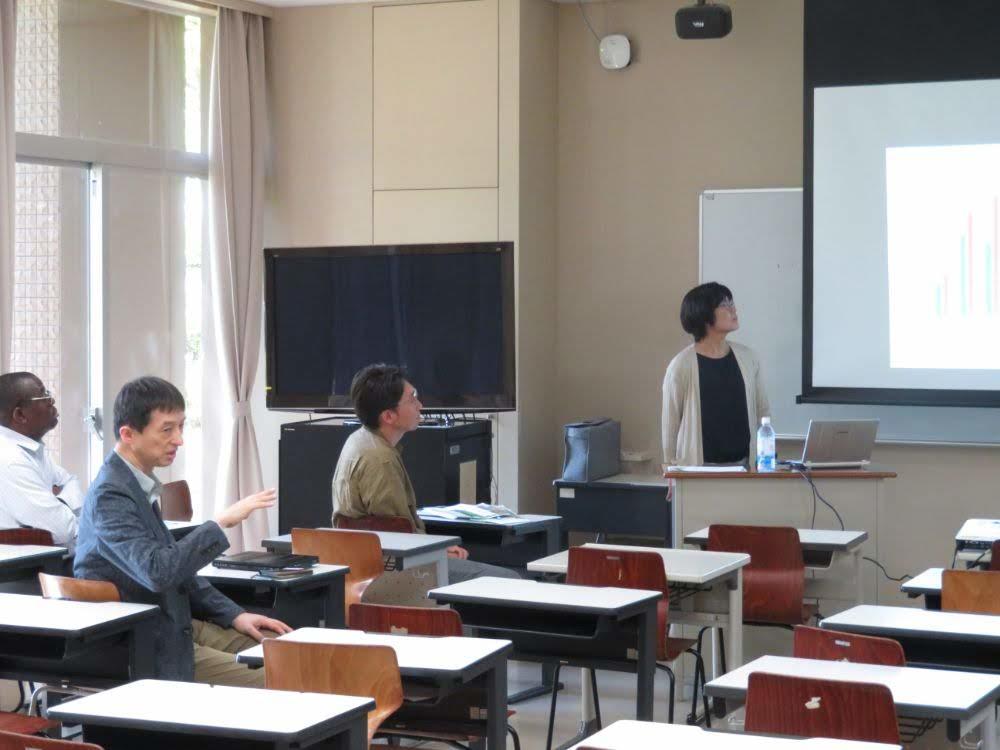◆Date & Time: Thursday, June 13, 2019 2:20 - 3:50 pm
◆Venue: Room 105, Research and Lecture Building, Tokyo University of Foreign Studies
◆Speaker: Dr. Aynalem Megersa (Visiting Associate Professor, Kyoto University / Director of Center for Gender Studies, Addis Ababa University)
◆Commentator: Ms. Yuka Kodama (Director of Gender and Social Development Studies Group, Inter-disciplinary Studies Center, IDE-JETRO)
◆Theme: Employment and Empowerment in the Rural Central Ethiopian Context: How does women's income earning impact on their agency?
◆Report:

Dr. Aynalem Megersa, Director of Center for Gender Studies, Addis Ababa University and also, visiting Associate Professor at Kyoto University, on Thursday, June 13, 2019, delivered a lectured at Tokyo University of Foreign Studies, on the theme: Employment and Empowerment in the Rural Central Ethiopia Context, how does women's income earning impact on their agency?
During this presentation, Dr. Aynalem Megersa asserted, Ethiopia has repressive gender relations to women. In Woreda region, where she carried out her research, Dr. Aynalem Megersa said, this region has asymmetrical labour differences between women and men and this repressive gender relations, has resulted into inequality. Dr. Aynalem Megersa stated that, out of her sampling of 765 respondents, results gathered showed that, more than third of the number are engaged in non-income earning wage, but on self-employment mainly through sole trade proprietorship. She reiterated that those employed in wage employment, considered it as less paid job. She stated through self-employment, women have been able to contribute towards their households and have helped improve their decision making powers at the household level.
Dr. Aynalem Megersa also indicated that, for those engage in wage employment, they are able to reduce the burden on their husbands, and as well helps to ensure their security and the security of their homes. However, Dr. Aynalem Megersa emphasized that, for both the self and the low earning employment, which the women have been engaged in, the income accrue from those enterprises, have not been able to significantly improved on their empowerment, and wellbeing.
However, Dr. Aynalem Megersa mentioned that, the current government has taken proactive steps to addressing these conditions countrywide, such as, the signing to the CEDAW law, and the rights of women enshrined in the national constitution, including many revised legal regimes in the country. Dr Aynalem Megersa noted also that, as a result of the current incremental moves towards improvement in these areas, the government has created a separate ministry, for women and youth.
Dr. Aynalem Megersa indicated that, even if women have been engaged in employment, both in self and wage labour, yet the infinitesimal amount gain in these developments have not contributed to the empowerment of these women in the country, despite the dominate narrative that many companies have provided employment to women. She also pointed out that, when talking about women's empowerment, it does not have to limitedly focus on women specifically, but also on what norms operate within the communities. Therefore, bringing men onboard in such discourse could play pivotal role. And that it is not only women's participation in the income earning activities, but how this participation has been culturally constructed.
In conclusion, Dr. Aynalem Megersa opined that, since 1980s, there has been much improvement in the rural labour market in Sub-Sahara Africa, leading to more increase of rural African women in livelihood enterprises. Generally, Dr. Aynalem Megersa mentioned that, the decline in the gap in the labour market between men and women over the years, in developing countries in the last several years, has been contingent an (a) there were many industries and companies that moved into these developing countries in search for cheap labour and (b) because of the increase of education in recent time. Further to the conclusion, Ms. Yuka Kodama, director of Gender and Social Development Studies Group, Inter-disciplinary Studies Center, IDE-JETRO, and also with vast research expertise on gender related issue in Ethiopia, served in a capacity as a commentator during this seminar session.

